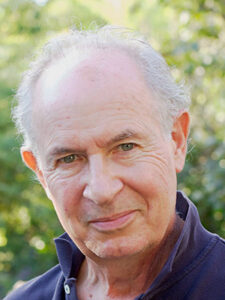John C. Zacharis First Book Award
We are pleased to present J. Estanislao Lopez with the annual John C. Zacharis First Book Award for his poetry collection, We Borrowed Gentleness (Alice James Books, 2022). The $1,500 award, which is named after Emerson College’s former president, honors the best debut book by a Ploughshares writer, alternating annually between poetry and fiction.
This year’s judge was John Skoyles, Ploughshares’ Poetry Editor. About the book, Skoyles writes: “The poems in J. Estanislao Lopez’s We Borrowed Gentleness are intimate and commanding, confiding and vatic. His is a poetry of witness to a complex of issues: heritage, labor, trust, family, faith, and art. The speaker stands before us, open and vulnerable, recounting anecdotally, speculating theologically, and perceiving fervently. All of it written dramatically, with an unmistakable tone of compassion and empathy. The result is a collection that turns the world inside out and displays a private life to the world. We Borrowed Gentleness has an alchemical force that makes the abstract concrete and gives an enduring voice to the unsayable.”
J. Estanislao Lopez is the author of We Borrowed Gentleness (Alice James Books, 2022). His poems are featured in the New Yorker, Ploughshares, POETRY, the Rumpus, Gulf Coast, and elsewhere. He earned an MFA from the Warren Wilson Program for Writers and currently teaches writing in his hometown, Houston, TX.
What was the inspiration for We Borrowed Gentleness?
While I am reluctant to suggest a single concept inspired the book, as I revisit it, I better perceive how a central tension drives its lyric development: namely, the tension between the historical imagination’s seriousness and the abstract imagination’s playfulness. Of course, thematically, the book orbits around ideas of masculinity, nationalism, and inheritance, but in the writing process, themes exert less influence than the frameworks of imagination. At least, that has been my experience.
What did you discover or grapple with while writing the collection?
I grappled with my own insecurities and flaws as a writer and person. Many of my poems undermine their speakers, and, as a poet, I would like to attribute that all to craft and artifice. However, it would be foolish to assume my imagination is free of the influence of those speaker’s same inherited psychic damage. Only through a personal reckoning could those ideas be honestly disassembled and critiqued. When ending a poem, I always questioned how far to let that critique clarify itself. Too clear, and the poem overcommits to a suggestion of safety; not clear enough, and the poem simply propagates the violence it is meant to interrogate. Hopefully, I get it right more often than not.
How has your work evolved since being published in the Winter 2017–2018 issue of Ploughshares?
I like the idea of evolution in one’s writing, rather than progression, because nature’s mutations are random and do not always improve one’s chances of survival. I used to believe that I would become a better poet with age, but I no longer commit myself to that kind of time-oriented stratification. One thing I do notice is that I have become a slower writer. I spend more time with poems before considering publication, and that likely gives them better odds of maneuvering away from the predictable path of least resistance.
What risk have you taken with your writing that has paid off?
I don’t know how much of a risk this is, but the unlikeable or flawed speaker is such a useful tool to my poetics. I notice my students often resist such speakers; they want their speakers to be likable heroes of the narrative, which is understandable for many reasons, artistic and historical. But, often, that lionization sacrifices complexity and truth. A defensive rhetorical stance can close the poem up and sever its tendrils. Of course, I’ve also read amazing poems with highly likable and heroic speakers; there are no laws in poetry.
What’s the most valuable piece of writing advice you received?
The best piece of advice I have received comes from my dear friends in poetry, and that is simply to not stop writing.
What’s next for your writing?
Hopefully, an interesting poem. Any greater ambition than that would only restrict my ability to write.

